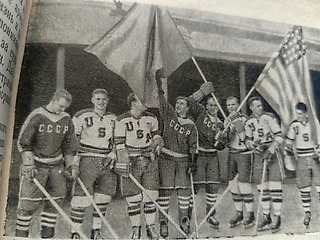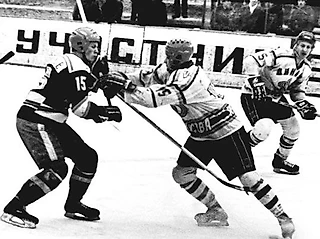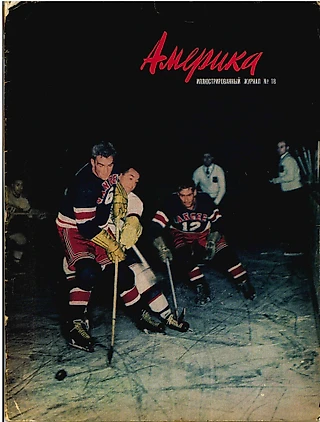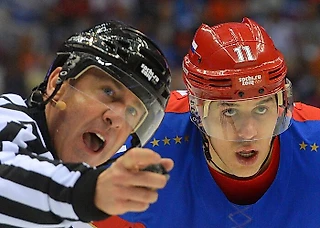Олимпиада-64. Вместо пьедестала к папе на прием
На Олимпиаде 64 года в Инсбруке, произошёл замечательный случай. Правила соревнований, волевым решением Джона Ахерна, тогдашнего президента ИИХФ, были изменены прямо во время соревнований. Сборная СССР, без вопросов, заняла первое место, а вот сборные Канады, Чехословакии, Швеции бились за место в тройке. В итоге, у трёх команд образовалось по пять побед и два поражения. По действующим тогда правилам, серебро доставалось канадцам. Но не тут-то было, правила изменили так, что второе место заняли шведы, третье-Чехословакия, а канадцы остались с носом. Вопрос был решён случайной жеребьевкой –канадская версия, версия одного нашего интернет издания- стали считать шайбы Удивлению канадцев не было предела. Они вроде как уже и собирались на церемонию награждения а тут такое.
Реакция наших СМИ на это была сдержанная. К примеру в книге посвященной этой Олимпиаде, написано, что сборная Канады потеряла шансы на призовое место, после игры с нашей сборной. К этой игре мы ещё вернёмся как-нибудь позже. Это в книге 1965 года. А вот уже в книге Озерова, вышедшей в 1976 году, Николай Николаевич возмущается действиями Джона Ахерна. Канадские газеты же, вышли же с карикатурами на своих игроков по этому поводу.

Но без поощрения канадцы всё же не остались. Как известно, их тренеровал Отец Бауэр. Вот он и решил, компенсировать лишение пьедестала своей команды неожиданным визитом, в качестве небольшого примирения. На обратном пути в Канаду, он сумел обеспечить аудиенцию в Ватикане с папой римским Павлом VI. На фото ниже представлены несколько игроков на встречи с папой Римским.











http://www.hockeycanada.ca/en-ca/Team-Canada/Men/Olympics/1980/CAN-Roster
Перед последним матчем турнира, СССР-Канада, канадцы еще расчитывали на золото, так как при победе они набирали одинаковое количество очков с СССР и благодаря победе в личной встречи выигрывали бы золото. По ходу матча канадцы вели 1:0 и 2:1, но сборная СССР вырвала победу 3:2. В какой-то момент во время этого матча (вроде бы в перерыве между 2-м и 3-м периодами), Ахерн созвал экстренное заседание исполкома ЛИХГ, который в срочном порядке изменил регламент -- с случае равенства очков учитывать общую разницу шайб. То есть, если до матча канадцы считали, что им нужно было "всего лишь" обыграть СССР, то перед 3-м периодом оказалось, что они должны были выиграть с разницей в 14 шайб, так как у сборной СССР было намного лучше общее соотношение шайб.
На результат матча СССР-Канада это вроде бы не повлияло, так как нет никаких свидетельств, что канадцы узнали об этом во время матча. Но вот если бы они выиграли и стали бурно праздновать олимпийское золото, то был бы совсем большой скандал.
Спасибо за подробности кстати!
...on the final day the Soviets eked out a 3-2 victory after scoring the only goal of the final period. Still, Canada had won the bronze medal. Or had it? As the team filed into the stadium for the medal ceremonies, it was informed the tie-break formula had been changed. The Canadians and Czechs were tied for third place, but the changed the tiebreaker to goal differential between ALL teams, placing the Czechs in bronze and Canada fourth.
http://www.hockeycanada.ca/en-ca/Team-Canada/Men/Olympics/1964/Home